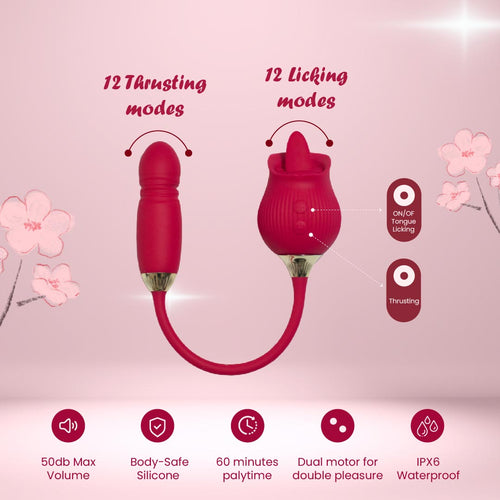
ABC’s of Bedroom Talks
Ever noticed how the most awkward bedroom conversations happen right when you're at your most vulnerable? Naked, breathless, and suddenly... silence.
78% of couples report improved satisfaction when they actually talk about sex. Yet most of us would rather fake an orgasm than have an honest conversation about what we want.
Bedroom talks don't need to feel like a performance review or therapy session. They're the secret sauce between mediocre and mind-blowing intimacy.
I've coached hundreds of couples through these conversations, and I promise you – the reward is worth those few seconds of awkwardness.
But how exactly do you start that conversation without killing the mood or bruising egos? That's where most well-meaning advice falls embarrassingly short.
Understanding the Importance of Sexual Communication
Breaking the Silence: Why Talking About Sex Matters
Sex talk scares a lot of people. But staying quiet about your needs? That's where real trouble starts.
Think about it - you wouldn't expect your partner to guess what movie you want to watch or what restaurant you'd enjoy. Why expect them to magically know what turns you on?
Most bedroom frustrations boil down to this: assumptions instead of conversations. When you don't speak up, resentment creeps in. Your partner keeps doing that thing you hate because you never mentioned it bothers you. Or they miss out on what really gets you going because you never shared it.
And honestly? Talking about sex gets easier with practice. The first conversation might feel awkward, but each one after that flows more naturally. That initial discomfort is worth pushing through.
Building Trust Through Open Dialogue
Trust isn't just about fidelity - it's about feeling safe enough to be vulnerable.
When you share what you want sexually, you're saying "here's the real me." That kind of honesty creates deeper bonds. You're not just naked physically; you're emotionally exposed too.
The magic happens when both partners create this judgment-free zone. No laughing at requests. No dismissing desires. Just two people saying "I hear you" and respecting each other's boundaries.
How Communication Enhances Intimacy and Satisfaction?
Good sex talk transforms bedroom experiences. Period.
When you communicate clearly, you:
-
Eliminate the guesswork
-
Avoid uncomfortable situations
-
Discover new pleasures together
-
Feel more connected during intimate moments
The best lovers aren't mind readers - they're good listeners who actually act on what they hear. They check in during sex: "Does this feel good?" "What would you like next?"
Remember, great sex isn't just physical technique - it's understanding what makes your specific partner tick. And you only learn that by talking about it.
Creating a Safe Space for Bedroom Conversations
A. Establishing Boundaries and Consent
Talking about what you want in bed shouldn't feel like a job interview. Start with small conversations about what feels good and what doesn't. Say things like "I really loved when you..." or "I'm curious about trying..."
Remember, consent isn't just sexy—it's essential. Ask questions and actually listen to the answers. Nobody should feel pressured into anything they're uncomfortable with.
Try this approach: share one thing you enjoy, then ask your partner to share something they like. This back-and-forth builds trust and keeps things balanced.
B. Timing Your Talks for Maximum Comfort
Bringing up bedroom topics while your partner is rushing to work? Bad move. Choose calm moments when you're both relaxed and have privacy—maybe during a quiet evening at home or a leisurely weekend morning.
Avoid these conversation killers:
-
Right after an argument
-
During family gatherings
-
When either of you is stressed or tired
-
In the middle of intimate moments
The sweet spot? Those comfortable moments when you're both feeling connected but not yet in the heat of passion.
C. Using Positive Language and Non-Judgmental Approaches
Words matter, especially when talking about something as vulnerable as sex. Frame conversations around desires rather than complaints: "I'd love to try..." instead of "You never..."
Criticism shuts people down faster than anything. Even if something wasn't great, focus on what would make it better next time.
D. Creating Privacy and Distraction-Free Environments
Your bedroom chat deserves full attention. Put phones away, turn off the TV, and make sure roommates or kids aren't about to burst in.
Create a comfortable setting—maybe light some candles, pour a glass of wine, or simply snuggle up together. The environment should feel safe and intimate, not like you're delivering a presentation.
Starting the Conversation: Practical Approaches
A. Simple Ice-Breakers for Nervous Partners
Getting the bedroom talk going doesn't have to feel like a job interview. Try these easy openers:
"I had this dream about us last night..." (Then share something playful)
"Remember when we first...?" (Reminiscing about early passionate moments creates instant connection)
"I saw something interesting online about..." (Mention something mild but intriguing)
The beauty of ice-breakers? They break the awkward silence without diving straight into the deep end.
B. Using "I" Statements to Express Desires
Saying "I'd love it if we tried..." hits differently than "You never do what I want." See the difference?
"I" statements take pressure off your partner while clearly expressing what you're craving. Compare:
"You always rush through foreplay" vs. "I really enjoy when we take our time with foreplay"
One creates defensiveness. The other opens possibilities.
C. Asking Open-Ended Questions
Closed questions get you one-word answers. Open questions spark conversation.
Instead of: "Did you like that?"
Try: "What parts of our last time together did you enjoy most?"
Good open questions include:
-
"What fantasies have you been curious about lately?"
-
"How do you feel when I...?"
-
"What would make you feel more comfortable trying...?"
D. Incorporating Humor to Ease Tension
Sex talk getting too serious? A well-timed joke can work wonders.
Self-deprecating humor works particularly well: "I might not be an expert at this yet, but I'm an enthusiastic student!"
Just remember to read the room—timing matters.
E. Using Resources Like Books or Articles as Conversation Starters
Sometimes letting experts do the heavy lifting helps. Try:
-
"I found this article about... want to read it together?"
-
"This podcast had an interesting point about... what do you think?"
-
"I grabbed this book that has exercises for couples. Wanna try one tonight?"
This approach takes pressure off by making the resource the focus, not your partner's immediate reaction.
Expressing Desires and Boundaries Clearly
A. Vocabulary Building for Sexual Communication
Talking about sex doesn't have to be awkward. Having the right words at your disposal can make all the difference. Start by getting comfortable with anatomical terms - they're just body parts, after all.
Beyond the basics, develop your "pleasure vocabulary" with words that describe intensity, rhythm, and sensation. Think "gentle," "firm," "slow," "building," or "intense." These descriptors help your partner understand exactly what works for you.
Don't shy away from metaphors either. Saying "like waves crashing" or "building like a slow song" can paint a vivid picture when literal terms fall short.
B. Describing Sensations and Preferences Effectively
The difference between good and mind-blowing sex often comes down to how well you can describe what you feel and want. Be specific! Instead of "I like that," try "I love when you use light pressure in circular motions."
Time references help too: "slower at first, then faster" gives clear guidance.
Compare new desires to established favorites: "Remember how you touched me last weekend? A bit softer than that would be perfect."
C. Communicating Boundaries Without Causing Hurt Feelings
Boundaries aren't rejections - they're roadmaps to better experiences. Frame them positively: "I'd love if we tried this instead" works better than "Don't do that."
Pick the right moment - not during intimacy, but in a relaxed, neutral setting. Use "I" statements: "I feel uncomfortable when..." rather than "You make me feel bad when..."
D. Negotiating Mutually Satisfying Experiences
The best bedroom experiences happen when both people feel heard. Try the "yes/no/maybe" approach - each partner makes lists of activities they definitely want, definitely don't want, and might try.
Check in regularly: "How does this feel?" and "Is there something else you'd like?" create space for adjustments.
Remember that negotiations evolve. What works today might change tomorrow. Keep the conversation going - just like your relationship, it's always growing.
Navigating Difficult Sexual Topics
Navigating Difficult Sexual Topics
Addressing Performance Concerns Compassionately
Talking about performance issues isn't easy. Nobody wants to hear "that's never happened before" when things don't go as planned. Instead of focusing on what went wrong, try something like: "I love being intimate with you regardless of what happens physically." Create a judgment-free zone where neither of you feels inadequate.
When your partner brings up concerns, resist the urge to get defensive. Listen first, validate their feelings, and then respond. Something as simple as "Thank you for trusting me with this" can make all the difference.
Discussing Sexual Health and Protection
Getting tested together isn't just smart—it's intimate. Make it part of your relationship routine, not a one-time awkward conversation. Say "I value us both staying healthy" instead of "We should get tested because I don't trust your past."
When talking about protection, be direct: "I brought condoms" works better than dancing around the subject. Remember, discussing protection isn't about trust—it's about mutual respect.
Managing Mismatched Libidos Through Conversation
Differing sex drives are normal. The problem isn't the mismatch—it's how you handle it. Start with "I've noticed something about our patterns" rather than "You never want sex anymore."
Be specific about your needs without making demands. "I feel most connected when we're intimate about twice a week" opens conversation better than vague complaints.
Talking About Fantasies Without Embarrassment
Sharing fantasies requires vulnerability. Start small with "I had a dream about us..." as a gentle entry point. Use positive framing: "I'd love to try..." instead of "I'm bored with what we're doing."
The golden rule? Never laugh at your partner's fantasies, even if they surprise you. A simple "Tell me more about that" keeps the door open to deeper intimacy.
Non-Verbal Communication in the Bedroom
Reading and Responding to Body Language
Bodies speak louder than words in the bedroom. Notice how your partner arches their back when you touch a certain spot? That's them saying "more of that, please."
Pay attention to subtle shifts - the way they move closer, tense up, or relax. These micro-movements are their way of guiding you without breaking the moment with words.
When your partner's body seems to freeze or pull away, that's a clear sign to pause or try something different. Nobody wants to ask "is this okay?" every two minutes, but watching how their body responds gives you those answers silently.
Try this tonight: slow down enough to actually notice these signals. You might be surprised how much your partner has been "telling" you all along.
Using Touch to Communicate During Intimacy
Touch is your secret language in bed. A gentle stroke says "I adore you," while a firm grip communicates desire and urgency.
The pressure, pace, and pattern of your touch all carry messages:
-
Light, feathery touches: "I'm taking my time with you"
-
Firm, deliberate pressure: "I want you now"
-
Rhythmic, consistent touch: "Stay right here in this moment"
When words feel awkward or might ruin the mood, your hands can take over the conversation. Want to guide your partner? Place your hand over theirs and show them - it's intimate instruction without a single word.
Understanding the Power of Eye Contact and Facial Expressions
Looking into your partner's eyes during intimate moments isn't just romantic - it's information-rich. Their pupils dilate with pleasure and contract with discomfort.
Those micro-expressions tell you everything:
-
Furrowed brow: something might be off
-
Relaxed jaw: they're comfortable and present
-
Slight smile: you're definitely on the right track
Most people instinctively close their eyes during intense pleasure, which makes those moments when they deliberately open them and look at you incredibly powerful.
Try holding eye contact during your next encounter. It might feel intense at first, but it creates a connection that turns good sex into an unforgettable experience.
Growing Together Through Sexual Communication
Growing Together Through Sexual Communication
A. Regular Check-ins to Evaluate Satisfaction
Gone are the days when couples suffered in silence about their bedroom needs. Regular check-ins aren't just for work projects—they're game-changers for your sex life too!
Try asking simple questions like: "What did you enjoy most last night?" or "Is there something you've been wanting to try?" These conversations don't need to be formal sit-downs. Chat while cooking dinner or during a relaxing evening walk. The key? Make them normal, not nuclear.
B. Adapting to Changing Needs Throughout Your Relationship
Your body at 25 isn't your body at 40, and your desires shift too. Life throws curveballs—stress, kids, health changes—that impact what you want and need sexually.
The couples who thrive sexually aren't necessarily the kinkiest—they're the most adaptable. Maybe quickies replace marathon sessions during busy periods. Perhaps massage becomes more important than penetration during recovery from an injury. Roll with these changes together instead of fighting them.
C. Learning and Exploring New Desires Together
Sexual exploration is like a never-ending treasure hunt you get to enjoy with your favorite person. Start small—share an article that sparked your curiosity or suggest trying a new position.
Remember, it's not about checking boxes—it's about discovering what makes you both feel amazing. Create a shared "curiosity list" where you both add things you might want to try without pressure to actually do them all.
D. Celebrating Successes and Improvements in Your Sex Life
Did you finally figure out that position that's been challenging? High five! Did you communicate a need without feeling embarrassed? Victory dance!
Acknowledging progress reinforces positive changes. It's like giving your relationship a gold star. Next time something goes particularly well, mention it: "I loved how relaxed we felt this morning" or "That new thing we tried was incredible!"
Open communication about intimacy serves as the foundation for a fulfilling sexual relationship. By establishing safe spaces for honest conversation, expressing desires clearly, and respecting boundaries, couples can foster deeper connections and mutual satisfaction. Remember that both verbal and non-verbal cues play vital roles in understanding each other's needs.
Your intimate relationship is a journey of continuous growth and discovery. Start implementing these communication strategies today—even small steps toward more open dialogue can yield significant improvements in your connection. As you practice the ABCs of bedroom talks, you'll likely find not only enhanced physical intimacy but also greater emotional closeness with your partner.












